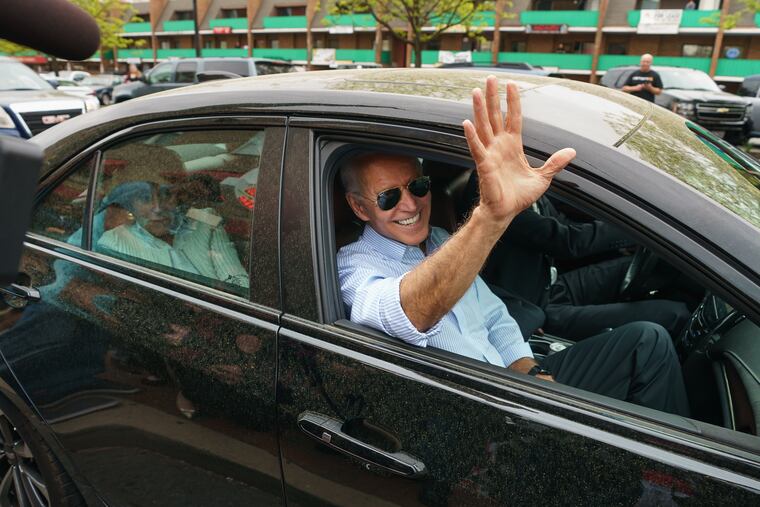Joe Biden 2020: How he could win. And why he might not.
Joe Biden joins the Democratic primary as the consensus leader in early polling, but history and a changing Democratic party suggests that he still faces obstacles in his attempt to win the nomination.

Former Vice President Joe Biden joined the Democratic presidential primary campaign Thursday as the consensus front-runner, based on early polling.
Still, history and a changing Democratic Party suggest that Biden faces obstacles in his attempt to win the nomination. Here are three reasons why Biden might win the primary and the right to challenge President Donald Trump, and three reasons why one last campaign for Biden might fall short.
Why Biden could win:
Early lead. It helps to have eight years as vice president to a president who remains hugely popular among Democrats. After his stint alongside Barack Obama, Biden has nearly universal name recognition, giving him an immediate advantage over many of his rivals, and 75 percent of Democratic voters view him favorably, according to the latest Morning Consult poll.
He has support from 30 percent of Democratic primary voters, according to the survey, concluded Sunday, the best in the field, ahead of Sen. Bernie Sanders’ 26 percent. And Biden has an even larger lead in the four initial primary states, the poll found. Even though he’s launching late, he’s already got a head start.
Blue-collar outreach. For all of the attention that liberal policy proposals have generated so far, Democratic voters consistently tell pollsters that above all they just want to win in 2020. And many in the party see Biden as the safest bet to do that.
Specifically, Biden’s allies argue that with his blue-collar appeal, including his roots in Scranton, he can win back the moderate Rust Belt voters who narrowly swung key states to Trump, including Pennsylvania, Michigan, Wisconsin, and Ohio. If he can show Democratic voters that he’s the candidate to accomplish that, he might satisfy his party’s main objective.
>> READ MORE: Trump, Biden clash as Democrats hope ex-VP can win back working-class voters, maybe White House
Cross-over appeal. The focus on Biden often centers on his middle-class roots, but his support goes beyond the white working class. Many African American political insiders remember his work with Obama, and the former VP has close ties to political leaders in South Carolina, where African Americans make up a majority of the Democratic primary electorate. “Joe has a track record with us," South Carolina State Rep. J. David Weeks told The Inquirer in February, after he introduced Sen. Cory Booker (D., N.J.) at a campaign event.
If Biden can hold onto both white working-class voters and African Americans, he’d be be tough to beat in the primary.
How he could lose:
A changing party. For all the fond memories Democrats have of the Obama years, many want to see new, younger voices, and leaders who reflect the party’s increasing reliance on women and people of color. At age 76, with nearly five decades in public life behind him, Biden hardly represents change.
And parts of his record have aged badly. Biden has faced recent scrutiny for his opposition to school busing in the 1970s; his support of a 1990s crime bill now blamed for disproportionately punishing minorities; his leadership of the Anita Hill sexual harassment hearings, and his often physical interactions with women, some of whom have said the contact was unwanted.
Some voters say he’s simply too old to be president, even if they like him.
Past stumbles. Biden has tried this twice before, without much success. His 1988 campaign folded amid accusations of plagiarism, and his 2008 run gained little traction.
There’s a difference between being the No. 2 figure on a ticket and leading the way, and so far Biden has had little success as the main attraction.
Fund-raising. As many Democratic activists demand that their candidates swear off big money, one of Biden’s first campaign stops is a major fund-raiser Thursday hosted by Comcast executive David L. Cohen at Cohen’s Philadelphia home. A cadre of old-guard Democratic donors is lining up financial support for him.
That may help Biden catch up with contenders who have months of fund-raising under their belts, but it won’t endear him to those who see virtue in small donations from everyday voters.
And it could speak to a limitation on Biden’s ability to raise money. He may start off with a big hit from supporters who give the maximum donation, but he won’t be able to go back to those people as the campaign rolls on, unlike, say, Sanders, who can hit up his army of small donors over and over.